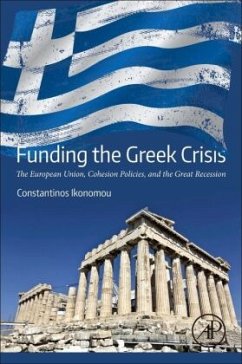How does one distinguish between European Union investments that improve welfare and those that create economic malaise? Funding the Greek Crisis: The European Union, Cohesion Policies, and the Great Recession explores the sources of the Greek Crisis that lie primarily in EU policies that appeared to have worked better for other countries but not for Greece. Without overly simplifying the Greek condition, it provides insights into policies the countries of the euro area may need to implement in order to ensure collective cohesion and individual success. Arguing that EU preferences for autonomous investments discouraged organic development with lasting implications, Funding the Greek Crisis sheds new light on the nature of regional competitiveness and public economics.
"Following the reading of this book, I strongly recommend it to a vast pool of academics and policy officials interested in understanding the effects of the implementation of EU Cohesion Policy in EU Member States, and especially in cohesion countries. In his research, the author focuses on the Greek case-study, by providing a detailed and critical analysis of the potential misuse of EU Cohesion Policy related socioeconomic Investments in Greece (1981-2011), whilst relating them to the triggering of the '2008 Greek crisis.' In all, the author provides an insightful and detailed guide to the Greek experience in implementing EU Cohesion Policy from a socio-economic perspective, whilst proposing novel avenues to correct past mistakes." --Eduardo Medeiros, Universidade de Lisboa
"This is an important book, which takes a new and insightful approach to understanding the Greek crisis. The links between domestic Greek economic performance and EU cohesion policies have, until now, been under-researched, and this book shines a bright light on a dark part of the Greek economic story." --Robert Ackrill, Nottingham Trent University
"A first-rate, rigorous analysis of the sources of the Greek crisis. This book offers a brilliant and remarkably clear understanding of the policies that the Euro area should implement towards collective cohesion and individual success. Highly Recommended." --Panagiotis Koutroumpis, Queen Mary University London
"This is an important book, which takes a new and insightful approach to understanding the Greek crisis. The links between domestic Greek economic performance and EU cohesion policies have, until now, been under-researched, and this book shines a bright light on a dark part of the Greek economic story." --Robert Ackrill, Nottingham Trent University
"A first-rate, rigorous analysis of the sources of the Greek crisis. This book offers a brilliant and remarkably clear understanding of the policies that the Euro area should implement towards collective cohesion and individual success. Highly Recommended." --Panagiotis Koutroumpis, Queen Mary University London







